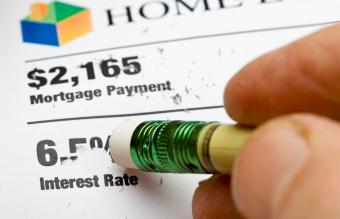
When you have an underwater mortgage, you owe more to the lender than your home is currently worth. An underwater mortgage can be a problem if you want to sell your home because there is a gap between what you owe on the house and what you can receive from the buyer - a gap that the mortgage lender expects you to pay them, unless you work out other circumstances.
Ways to Get Above Water
You can deal with an underwater mortgage with a few different approaches. The approach you use depends on what you are trying to accomplish and your personal financial situation.
Refinance
A regular refinance is not usually an option when you owe more on your mortgage than the home is worth. With government programs, such as those introduced by the Obama Administration, homeowners do have the option of refinancing. Generally, these programs are for homeowners with Fannie Mae or Freddie Mac mortgages.
Some of the programs allow homeowners with these mortgages to refinance to lower monthly mortgage payments, interest rates and terms of mortgages to make the mortgage more affordable. These programs can eliminate the need for a new appraisal, for example, which is something that a standard refinance requires. The Making Home Affordable website can help you pinpoint programs that are available for refinancing a mortgage that is underwater.
Stay Put
You always have the option to stay put and pay the mortgage down. In this scenario, you can continue to live in your home as long as you continue to make your mortgage payment. The stay and pay option is best for homeowners that do not intend on moving or selling their home.
You can wait it out to see if the home increases in value and can decide to sell at that time. For a home that has decreased in value, property owners should consider contacting the local tax assessor to have the home reassessed. A lower property value can decrease your property taxes.
Short Sale
A short sale is when you sell the home for less money than you owe on the mortgage. You have to get permission from your mortgage lender to enter into a short sale agreement with a buyer. The good news is that you can walk away from the property after the sale of the home.
The bad news is that you also don't walk away from the sale of the home with any profit from the sale. A short sale can also negatively impact your credit report. Additionally, the lender can sue you for the difference between what you owe and what the home sold for. Check with your lender and read your short-sale agreement carefully to see if they have any recourse for making you pay the deficit.
Mortgage Modification
A mortgage modification is a change in the terms and conditions of your existing mortgage. Modifications used to be routinely offered as ways to lower your interest rate without a full refinance, but they are more commonly used nowadays as a way to help homeowners with mortgages underwater. Some lenders will require proof of a major financial hardship before they will approve a modification.
The mortgage company has the right to approve or deny the modification. The modification does not relieve the homeowner from paying the mortgage. It can, however, make the mortgage payment more affordable by modifying the mortgage balance, the monthly payment or the interest rate of the mortgage.
File for Bankruptcy
Filing for bankruptcy should be a last ditch effort when you have exhausted all of the other options available to you. Generally, filing for bankruptcy is only appropriate when you have other financial problems in addition to not being able to make your monthly mortgage payment.
When you file for bankruptcy, you are working with your creditors to write off your debts or renegotiate the terms and conditions of your debts because you are no longer able to afford paying. Filing for Chapter 7 bankruptcy does not erase or restructure your mortgage debt. Filing for Chapter 13 bankruptcy, however, can help you reconfigure your debt to free up the additional cash you normally pay toward your other debts to cover your mortgage payment.
Walk Away
Walking away from your home and mortgage is not always the best option because when you stop paying for your mortgage it sends you into foreclosure. Foreclosure is a major blemish on your credit report, which can make it difficult to establish new credit in the future and can also make it difficult to rent or buy a new place to live.
Getting Above Water
When you find yourself in a situation where you owe more on your mortgage than your home is worth, it is not necessarily the end of the line for you. You have several options available to you to turn your situation around. Consider speaking to a financial professional to help you decide which option is best for your situation.







